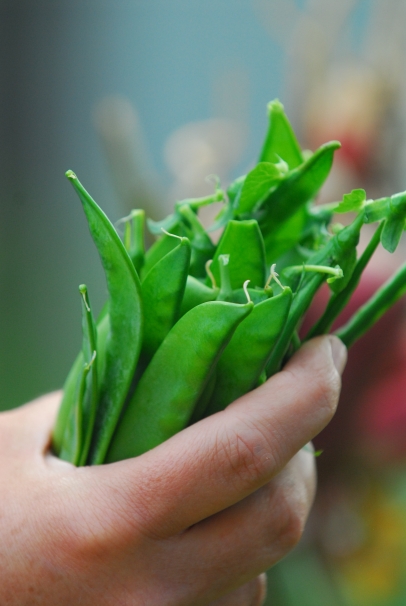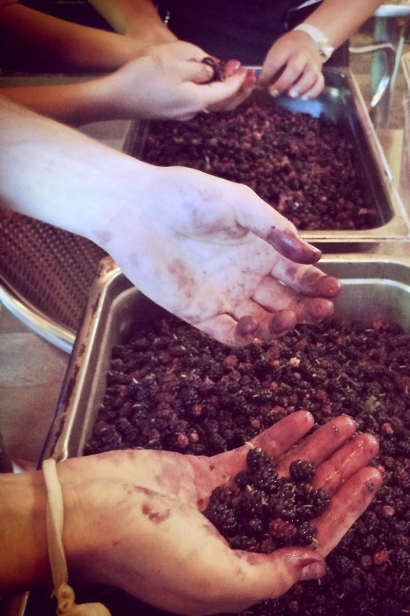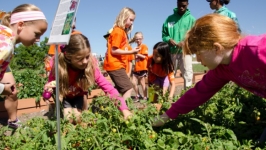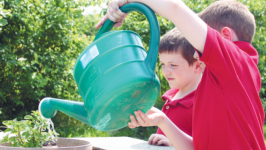Launch Pad to a Better Life
There’s a quote floating around the Internet. The verbiage varies, but the gist is the same: You can count the number of seeds in an apple, but you can’t count the number of apples in a seed.
A group of current and former Purdue University students are endeavoring to plant the seeds, figuratively and literally, to feed generations of some of the state’s neediest residents. They are members of Earthonauts, a nonprofit group aiming to inspire sustainability in everyday lives. Their first focus: urban communities with tenuous sources of fresh food.
“The idea behind it is to promote sustainability in communities,” says Chris Kulesza, an Earthonauts vice president and Purdue PhD candidate in political science.
For the past year, the group has been working with residents of the Lake County Juvenile Detention Center in Crown Point. There, Earthonaut volunteers work with small groups to present hands-on lessons in science, technology, engineering and mathematics (STEM) as well as sustainability. These lessons focus on more than growing food: They also stress the need to be both economically and socially sustainable, so their efforts will continue long after the teachers have gone home.
“We want Earthonauts to be more than growing tomatoes,” says Jocelyn Dunn, a Purdue PhD program graduate, who co-founded Earthonauts last year with Purdue graduate Katie Chustak. “Maybe we can pair with a small restaurant where the kids learn financial responsibility and teamwork. Maybe they can grow lavender and make essential oils. We’ll teach the environmental resource aspect and how to sustain any project. We’ll show them how to have the community behind them and make sure it’s benefitting the community.”
Growing minds
These are lofty goals, Dunn acknowledges, but even the mightiest tree began as a small seed. For now, she and other Earthonaut volunteers are visiting the Detention Center every couple of months with lessons for young people whose primary food source may be the corner convenience store. They bring plenty of interest-piquing science demonstrations, like the lightbulb that used a potato to make a complete circuit, and colorful handouts that summarize lessons through pictures and short paragraphs.
“For the most part, the kids love it,” says Jack Thomas, the Detention Center’s education department head. “It’s something different for them. They’re getting exposed to things they would never get in their regular school setting.”
One of their first ventures was a hydroponic garden set up in the Detention Center’s cafeteria. The flower garden uses hydroponic technology to grow flowers using water and nutrients, reusing the water and cutting down on the need for soil and space. There were a few bumps along the way—the center does not have much natural light and lamps had to be added—but there were also learning opportunities for the residents, who can enjoy the sound of water and blooms in their cafeteria.
“I worked with the kids on the hydroponics,” says Geraldine Giglio, the facility’s director. “When they had their hands on the roots and in the water, they were ecstatic.”
Lesson plans
Teachable curriculums are the backbone of the program. Dunn and other volunteers all have other jobs and commitments, but in their spare time they are working on lesson plans that can be reproduced and taught in classrooms and community centers. They rely on hypothetical situations to encourage participants to think beyond the obvious. An upcoming lesson on a Mars mission, for instance, asks the residents to consider how they would feed themselves during the months-long travel to the neighboring planet. What should they pack? How would they communicate? How are they going to return?
The residents have different reactions, says Chris Kulesza. There might be some blank stares and nodding off. But there also might be enthusiasm and questions.
“Plenty of them are very intellectually curious and pick this up quickly,” Kulesza says. “When we meet with them, it is very obvious that several of them want to go back [home] and do something [productive].”
Planting those seeds
Erich Huebner, a Purdue graduate and Earthonauts executive board member who now works in the university’s research computing department, has a special place in his heart for the program. His hometown of Dyer is a Crown Point neighbor, and he has a unique understanding of the area’s challenges. He keeps in touch with the Detention Center’s directors and teachers, compiling surveys and gathering lesson feedback.
Granted, not everything is an option for Earthonauts lessons. Explosions are out. A garden is a possibility, although the facility needs money and volunteers to make it happen.
“We could probably get the plants and seeds,” Giglio says. “Our staff is devoted to watching the kids—watching them with the tools and watching them with the seeds, but we need volunteers to come in and work with them.”
Perhaps the hydroponics will come back into play. Perhaps the residents will spend time digging in the dirt and go back home to their families and say, “Let’s plant our own garden.”
“Even if we can plant something where something would grow, that would be great,” Huebner says. “If we can influence that out-of-the-box thinking that leads to more healthy eating and sustainable choices, that would be amazing.”
What’s in the Name
Earthonauts takes its name from the concept that everyone is an astronaut traveling together on a spacecraft called Earth. Participants are encouraged to develop astronaut traits, such as resourcefulness, adaptability and self-care. Founder Jocelyn Dunn comes by the association honestly, having spent eight months in a remote part of Hawaii as part of the HI-SEAS mission, a joint effort by NASA, University of Hawaii at Mānoa and Cornell University, that replicates a trip to the planet Mars.
The Earthonauts curriculum often incorporates outer space into its lessons, but it also uses space exploration as an analogy for sustainable living. In space, there are no fast-food restaurants, says Earthonaut volunteer and Purdue graduate Erich Huebner. If astronauts—or Earthonauts, in this case— are hungry, they need to figure out a way to feed themselves with the resources at hand.
The group is currently road testing its lessons at the Lake County Juvenile Detention Center in Crown Point, but its long-term plan sees its outreach expanding to both kids and adults, especially in those communities where fresh food and other sustainable resources are scarce. The young people who participate in Earthonauts at Crown Point may be the pioneers who dig out sustainable options for their families and neighbors.
“We really thought [the Lake County Detention Center] was a good place to start,” said Kulesza. “If you’re talking about community development, getting to young people is the absolute key. Knowing that these kids are going back to their communities means this is an opportune place to do projects like this.”








